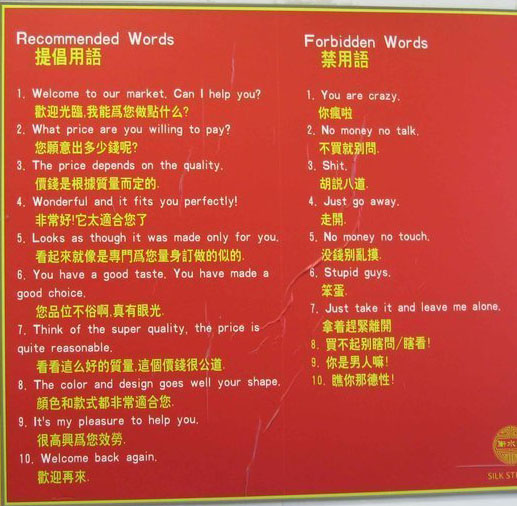September 27, 2007
Forbidden Language and "Virtuous" (i.e., Disgusting) Conduct
[Guest post by Victor Mair]
This poster is from the Silk Street Market in Beijing.

Since the exact same sign is also found in the Pearl Market (a bustling multi-story "mall") in Beijing, it is probably standard issue for a certain type of store complex. Now, one who has not spent much time in Beijing may think that salespersons could not possibly speak to customers in terms that are as crudely offensive as the "forbidden words", but I have personally heard every single one of these expressions in stores throughout Beijing.
I shall not provide a commentary on all ten of the items that have supposedly been prohibited by the management, because most of them are fairly straightforward. I shall, however, note only that No. 3 sounds worse in English ("shit") than it does in Mandarin (HU2SHUO1BA1DAO4 ["nonsense; rubbish"]). No. 6, BEN4DAN4, literally means "stupid egg," but should be rendered as "fool; idiot."
The translator failed to rise to the occasion on Nos. 8-10. These last three items do become progressively more elusive and difficult to translate, but my attempts are below.
8. "If you can't afford it, don't ask blindly / look blindly" (i.e., don't ask stupid questions / don't keep looking blindly [at the goods]).
9. "Are you a man?" (a challenge to the potential buyer's masculinity [a *real man* would buy this thing right away without pussyfooting around]). Keep in mind that most of the sales personnel who would be hurling this sort of charge would be women.
10. "Just look at how disgusting / revolting you are!" QIAO2 NI3 NA4 DE2XING4. Literally, "look you that virtuous-behavior / nature." The use of DE2XING4 ("virtuous-behavior / nature") to mean virtually its opposite is a good example of the penchant for extreme FAN3HUA4 ("irony; facetiousness") that is pervasive among various social groups in China.
As a matter of fact, the first few times I heard this put-down back in the 80s, it was reduced just to the last two syllables -- DE2XING4 -- and I couldn't for the life of me understand what was so bad about saying "virtuous behavior / nature" to someone. But I could tell unmistakably from the withering tone of voice and the dismissive half-turning away that left the customers wilting like delicate flowers under a scorching sun that something awful had been uttered. Furthermore, to achieve the full effect, DE2XING4 has to be enunciated with exactly the right rhythm and emphasis. The DE2 is a long, drawn-out, rising tone, and the XING4 is a rapidly falling tone -- sometimes accompanied by a snort and a sneer.
According to my jealous yet awed friends from other parts of China, only a Beijing woman can articulate DE2XING4 with just the right nuance to reduce the object of her contempt to smithereens: DUUUUHHH-SHEENG! (I should mention, however, that I have heard Nanjing women and Ningbo women unleash totally different types of indirect invective that are every bit as impressive and devastating in their own way as the DE2XING4 of a Beijing shopgirl.)
To make a few general observations before closing, note that the recommended expressions on the left are much more verbose in comparison with the forbidden insults on the right, which, except for No. 7, are uniformly laconic. (I think it will be next to impossible to train Beijing sales girls to produce such lengthy, unctuously polite expressions. They prefer to speak in short blasts and bursts.) Furthermore, it is remarkable once again (as I have pointed out in previous posts) that bilingualism is such a conspicuous feature of the contemporary scene in China (at least in the big cities), with English playing an increasingly prominent role in so many areas of daily life. Finally, it is worth pondering why the quality of the translations of the acceptable expressions, while far from perfect, is so much better than that of the forbidden expressions. Though I have some ideas about why that is so, I leave it to my readers to come up with their own explanations for this curious phenomenon.
[Photo from 1largeprawn]
Posted by Mark Liberman at September 27, 2007 01:54 PM